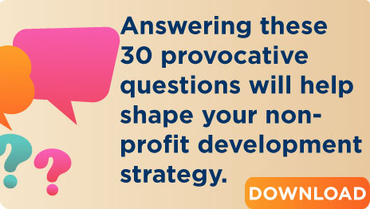 "It takes more than a good heart."
"It takes more than a good heart."
These were words spoken to me by the Senior Pastor at my church when he was convincing me to take a major role in the upcoming capital campaign. He was right. You know yourself in today’s competitive fundraising environment that it takes more than a staff with a love for your cause to secure a major gift from an individual or a corporation. It takes talent to be a successful development officer.
Talent is different than skills. Skills can be learned. Talent is innate. So if you are facing a big increase in your fundraising budget this year or next, the most important thing you can do is employ fundraising professionals with the innate behaviors that will allow them to ask for and receive major gifts from a wide variety of donors.
But what talents, what innate behaviors, should you look for? Based on research with thousands of professionals whose role is to seek commitment, we suggest strongly that you look for these eight key talents:
1. Intensity for the work effort.
Getting in front of key donors is hard work and uncovering their underlying needs and goals for giving requires effort as does fashioning a tailored solution. The best fundraising professionals love to work and go about their work in a very focused manner. They work hard, they work smart, and they work long.
2. Discipline.
The very best have standards for excellence and produce quality work. They can manage details easily and spin multiple plates, rarely dropping a single one.
3. Successful development officers are not afraid to ask.
They have a certain command about them that allows them to persuade and convince naturally. They are very comfortable with the notion that they must bring others around to their way of thinking.
4. The very best are great problem solvers.
They gather more information, they ask better questions, and they devise more creative solutions.
5. We see that top performers have a positive outlook.
For these people, the glass is always half full, they deal with change well, and they have a wide circle of people who like them.
6. The best are also blessed with a “sixth sense” that allows them to pick up on how someone is feeling at the moment.
This genius-level empathy allows them to know how and when to proceed. Donors feel a real sense of being cared about—because they are.
7. In order to ask for big donations, you have to feel as though you deserve a big donation.
Top people see themselves as significant, worthy of sitting with high-net-worth individuals and top corporate officers. They can make a “big ask” because it lines up with their self-image.
8. If you are going to meet a goal you have to think in terms of measurement and winning.
Top performers are constantly striving to best last year’s, last month’s, and even yesterday’s performance. They think in terms of winning, and when they are winning for your cause, everyone wins.
And we look for these additional indicators in people we would consider for a role that involves asking for a big commitment:
- The very best always do exactly what they say they will do and they don’t make promises they’re not sure they can keep. They feel absolutely terrible if they make a mistake, so they go out of their way never to do that.
- The best have this DNA that causes them to think constantly and creatively about the impact of what they proposing to the individual or the corporation. As you well know, fundraising is more than sophisticated begging. It’s more about understanding corporate needs, personal wins, and heartfelt causes. You want fundraising professionals who will be naturally thinking about these things.
- The best salespeople—and development professionals really are salespeople, right?—has to overcome their natural call reluctance. If you’re thinking that people who are really good at asking for big commitments would not experience call reluctance, think again. It’s just the opposite. The best experience call reluctance every day because it’s so important to them that they not fail. The very best development people have the intestinal fortitude to overcome their call reluctance while mediocre or weak ones find ways to keep busy and excuses to avoid contacting and asking. You might know a few of these by name.
If you are still reading, you have realized by now that none of the behaviors above can be trained. My company does training in cause selling, but I will tell you that you must begin with talent. Those on your development staff with a natural problem solver behavior are far more curious than the average bear and will respond far better to training on how to uncover needs.
So, what should you do? Here are some recommendations:
- Most people hire their fundraisers based on experience, then skills, and then maybe some cursory consideration for natural talent. Stand that model on its head. Start by observing some of the behaviors we listed above whenever you’re interacting with a candidate. What has the candidate done to get the interview? How did they go about it? What stories have they told you? What can glean from what you see and hear?
- Think about the job you have open, the behaviors you are looking for, and write some questions to help learn about the degree to which the candidate actually displays those behaviors. Open-ended questions work well. Tell me about a major gift (or a corporate sponsorship) you put together that took a long time to sell in. How did you that? Then listen!.
- Use a validated talent instrument. Gut can be helpful when hiring any professional, but every gut is made much better with good science. Think you cannot afford a good talent assessment? Do some calculations on the cost of staff turnover caused by poor selection decisions. It can sobering.
Remember, you can give someone experience and you can teach them skills. But you cannot give them talent. It takes more than a good heart.
Jim Hopes is the CEO of The Center for Sales Strategy, a consulting and training firm that works with firms in the non-profit space.

 "It takes more than a good heart."
"It takes more than a good heart."
